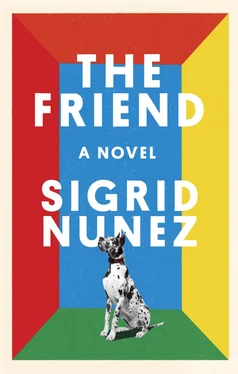• • •
And weren’t you the one who told us that Ted Bundy once manned a phone for a suicide prevention center?
Ted Bundy.
Hi. My name is Ted and I’m here to listen. Talk to me.
• • •
That there was to be a memorial took us by surprise. We who had heard you say that you would never want any such thing, the very idea was repugnant to you. Did Wife Three simply choose to ignore this? Was it because you’d failed to put it in writing? Like most suicides, you did not leave a note. I have never understood why it is called a note . There must be some who don’t keep it short.
In German they call it an Abschiedsbrief : a farewell letter. (Better.)
• • •
Your wish to be cremated had been respected, at least, and there was no funeral, no sitting shivah. The obituary stressed your atheism. Between religion and knowledge, he said, a person must choose knowledge.
What a preposterous thing for anyone who knows anything about Jewish history to say, one comment read.
• • •
By the time the memorial took place the shock had worn off. People distracted themselves with speculation about what it would be like to have all the wives in one room. Not to mention the girlfriends (all of whom, the joke went, wouldn’t fit in one room).
Except for the slideshow loop, with its hammering reminder of lost beauty, lost youth, it was not very different from other literary gatherings. People mingling at the reception were heard talking about money, literary prizes as reparations, and the latest die, author, die review. Decorum in this instance meant no tears. People used the opportunity to network and catch up. Gossip and head-shaking over Wife Two’s oversharing in memoriam piece (and now the rumor that she’s turning it into a book).
Wife Three, it must be said, looked radiant, though it was a cold radiance like that of a blade. Treat me like an object of pity, her bearing announced, hint that I was somehow to blame, and I will cut you.
I was touched when she asked me how my writing was going.
Can’t wait to read it, she said untruthfully.
I’m not sure I’m going to finish it, I said.
Oh, but you know he would have wanted you to finish. ( Would have .)
That disconcerting habit she has of slowly shaking her head while speaking, as if simultaneously denying every word she says.
Someone semi-famous approached. Before turning away she said, Is it okay if I call you?
I left early. On my way out I heard someone say, I hope there are more people than this at my memorial.
And: Now he’s officially a dead white male.
Is it true that the literary world is mined with hatred, a battlefield rimmed with snipers where jealousies and rivalries are always being played out? asked the NPR interviewer of the distinguished author. Who allowed that it was. There’s a lot of envy and enmity, the author said. And he tried to explain: It’s like a sinking raft that too many people are trying to get onto. So any push you can deliver makes the raft a little higher for you.
If reading really does increase empathy, as we are constantly being told that it does, it appears that writing takes some away.
• • •
At a conference once, you startled the packed audience by saying, Where do all you people get the idea that being a writer is a wonderful thing? Not a profession but a vocation of unhappiness, Simenon said writing was. Georges Simenon, who wrote hundreds of novels under his own name, hundreds more under two dozen pen names, and who, at the time of his retirement, was the bestselling author in the world. Now, that’s a lot of unhappiness.
Who boasted of having fucked no fewer than ten thousand women, many if not most of them prostitutes, and who called himself a feminist. Who had for a literary mentor none less than Colette and for a mistress none less than Josephine Baker, though he was said to have ended that affair because it interfered too much with work, slowing that year’s novel production down to a lousy twelve. Who, asked what had made him a novelist, replied, My hatred for my mother. (That’s a lot of hatred.)
Simenon the flâneur: All my books have come to me while walking.
He had a daughter, who was psychotically in love with him. When she was a little girl she asked for a wedding ring, which he gave her. She had the ring enlarged to fit her finger as she grew. When she was twenty-five, she shot herself.
Q. Where does a young Parisienne get a gun?
A. From a gunsmith she read about in one of Papa’s novels.
• • •
One day, in 1974, in the same university classroom where I sometimes teach, a poet announced to the workshop she was teaching that semester: I may not be here next week. Later, at home, she put on her mother’s old fur coat and, with a glass of vodka in hand, shut herself in her garage.
The mother’s old fur coat is the kind of detail writing teachers like to point out to students, one of those telling details—like how Simenon’s daughter got her gun—that are found in abundance in life but are mostly absent from student fiction.
The poet got into her car, a vintage 1967 tomato-red Cougar, and turned on the ignition.
• • •
In the first writing course I ever taught, after I’d emphasized the importance of detail, a student raised his hand and said, I totally disagree. If you want a lot of details, you should watch television.
A comment I would come to see was not really as dumb as it seemed.
The same student also accused me (his words were writers like you ) of trying to scare other people by making writing seem much harder than it was.
Why would we want to do that? I asked.
Oh come on, he said. Isn’t it obvious? The pie is only so large.
• • •
My own first writing teacher used to tell her students that if there was anything else they could do with their lives instead of becoming writers, any other profession, they should do it.
• • •
Last night, in the Union Square station, a man was playing “La Vie en Rose” on a flute, molto giocoso . Lately I’ve become vulnerable to earworms, and sure enough the song, in the flutist’s peppy rendition, has been pestering me all day. They say the way to get rid of an earworm is to listen a couple of times to the whole song through. I listened to the most famous version, by Edith Piaf, of course, who wrote the lyrics and first performed the song in 1945. Now it’s the Little Sparrow’s strange, bleating, soul-of-France voice that won’t stop.
Also in the Union Square station, a man with a sign: Homeless Toothless Diabethee. That’s a good one, a commuter said as he tossed change into the man’s paper cup.
• • •
Sometimes when I’m on the computer a window pops up: Are you writing a book?
• • •
What does Wife Three want to talk to me about? I am not as curious as you might expect. If there had been a letter or some message from you, surely I’d be in possession of it by now. She may be planning some other kind of memorial, a collection of written remembrances, say, and if that’s the case she will again be doing something you said you did not want.
I dread the meeting, not because I dislike her (I don’t), but because I don’t want to be part of any of these rites.
And I don’t want to talk about you. Our relationship was a somewhat unusual one, not always easy for others to grasp. I never asked, and so never knew, what you told any of your wives about us. I was always grateful that, though Wife Three was never my friend like Wife One, at least she was not my enemy like Wife Two.
Читать дальше












